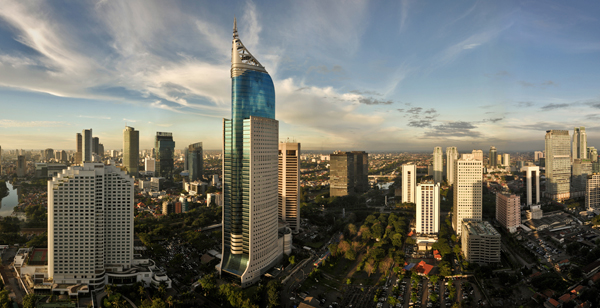By Cameron Bates (Property Report)
Straddling the equator for more than 5,000 kilometres, Indonesia is an epic and multi-faceted place. Nowhere are its vast contrasts better demonstrated than in the capital Jakarta, where luxury vehicles inch through congested streets overlooked by low-paid construction workers labouring on the latest multi-million-dollar, mixed-use-development projects.
Despite a downturn in GDP growth on the back of weak consumption, investment and exports, the residential property market continues to remain a bright spot thanks to an expanding middle-class and affluent consumer population, which currently stands at 75 million people and is expected to hit 141 million by 2020, according to a report by leading consultancy firm Boston Consulting Group.
“Indonesian real estate is set for a significant uplift in 2016,” Kian Moini, the co-founder of online real estate marketplace Lamudi, says. “With changes to foreign ownerships laws and various government stimulus packages coming into place, significant growth is predicted.”
Jakarta, which was named the fastest growing luxury property market in the world in 2014 with price growth of 37.7 percent by Knight Frank, has since seen a decline of 11.2 percent due to a reduced number of expatriate arrivals and business travellers.
Compared to the average global growth of 2 percent, the country’s capital remains one of the hotspots for luxury property in Asia, if not the world.
“Urbanisation, development demand and property booms will all continue in various sectors with an expected economic recovery in the next three years, but with greater demands on design quality and uniqueness,” he adds. “We will also see new types of residential properties as Indonesia’s urban population continues to grow and undergo cultural change.”
“We believe that transit-oriented hubs will characterise the urban landscape with developers competing through design and location for their share of this prospective market,” he says.
Indonesia’s behemoth capital will continue to undergo a major urbanisation-driven transformation, similar to those seen in Shanghai and Shenzhen in China in the coming years, and some of its peripheral cities are already reaping the rewards.
Located on the eastern border within the Greater Jakarta region,Bekasi is the fastest-growing urban centre in Indonesia. Its proximity to the toll road and train links to the Jakarta CBD, and the expansion of industrial zones and port developments nearby have made it a popular choice for investors, while Serpong, also in Greater Jakarta, is another hugely attractive enclave. It was here that developer Summarecon enjoyed one of 2015’s sales success stories with its Rainbow Springs project, which introduced the concept of condo-villas to the area.
Expectations are also high that Bandung, the capital of West Java, will become a model urban development in Indonesia with its architect mayor, Ridwan Khamil, driving an acclaimed smart city initiative, which provides platforms for citizens to actively participate in the city’s development via smart technology and social media.
While Jakarta and West Java look set to enjoy more growth, the residential property market in Bali, Indonesia’s most potent tourist draw, remains stagnant. Analysts believe that the government needs to invest in tourism infrastructure to counter the decline in commodities.
“New developments like the mixed-use, cliff-side Seven Heaven project in the south of the island – a development that in the past would have been a five-star hotel – will capitalise on the low supply of smaller high-quality units that appeal to both domestic and foreign buyers,” said Spies.
The inauguration ASEAN Economic Community is also expected to boost the local real estate sector in 2016, as well as plans to revise the current foreign ownership laws.
“A change in foreign ownership legislation will obviously carry momentum but nothing has been finalised yet,” Todd Lauchlan, country head of Jones Lang LaSalle Indonesia. “I think the biggest impact, in terms of market impact, of allowing foreigners to buy will be Bali. The demand is already there but hasn’t really been satisfied by the current structure. It will also unlock other markets that have previously been under the radar.”
With foreign ownership reforms practically in the post and ambitious infrastructure projects underway, President Joko Widodo’s government appears to be making many positive noises to make Indonesia more investor-friendly. Developers, meanwhile, are upping the ante in terms of quality and imagination when it comes to new projects. In a country as huge and diverse as Indonesia, observers have come to expect the unexpected, but all the signs point to a successful 2016 for the country’s real estate sector.
Image: Sourced from worldpropertyjournal.com
The full version of this article originally appeared in Property Report magazine issue no. 135.




